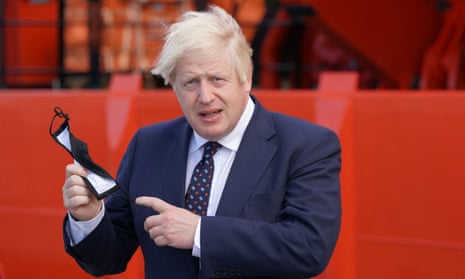Boris Johnson has said he will not self-isolate after a member of his team tested positive for Covid.
Downing Street said the prime minister did not come into close contact with the civil servant during the trip to Scotland, but a source said the pair had been “side-by-side” on several occasions and also flew in the same small aircraft between Glasgow and Aberdeen.
So what are the rules covering what you should do if you’re notified by a contact-tracing service after being in close contact with someone who has tested positive?
According to government guidance for England, you’re advised to stay at home and complete 10 full days isolation because you’re at risk of developing Covid yourself. This is the same in Scotland, Wales and Northern Ireland.
According to Public Health England, a contact can be anyone who lives in the same household, has had face-to-face contact within one metre, been within one metre for one minute or longer, or been within 2 metres for more than 15 minutes of someone who has tested positive – whether as a one-off or added up together over one day.
A close contact may also be someone who has travelled in the same vehicle or plane as an infected person.
The isolation period includes the date of your last contact with them and the next ten full days.
If you have been vaccinated, with one or two doses, you still need to self-isolate.
However, the rules will change on 16 August to allow fully vaccinated adults and under-18s in England to avoid isolation. In Wales, this will come into effect on 7 August, and in Scotland on 9 August. Northern Ireland is to hold further talks on the matter next week.
Instead, the double-jabbed will be advised to take a PCR test and can stop isolating if the result is negative. In Wales, people will also be advised to take PCR tests on days two and eight.
There is separate guidance for frontline NHS and social care staff in England. Double-vaccinated staff who have been told to self-isolate are permitted to keep working after having a negative PCR test and daily negative lateral flow tests for a minimum of seven days – but this is only if their absence may prove detrimental to patient care.
Fully vaccinated health and social care workers in Scotland may also be exempt from self-isolation but only in “extreme circumstances as a last resort”. Exemption is voluntary and depends on a negative PCR test followed by daily negative lateral flow tests for 10 days.
Daily contact testing is also being rolled out in England for 16 key sectors in which the self-isolation of close contacts would result in serious disruption to critical services. A similar scheme is in place in Scotland for these critical industry sectors.
In Scotland, blanket self-isolation for schoolchildren will also end on 9 August. Pupils will no longer be required to isolate for 10 days when someone in their bubble tests positive, as long as they test negative themselves.
If you think you are a contact but have not been notified by a contact tracing service, you should arrange to take a PCR test, even if you don’t have symptoms.
